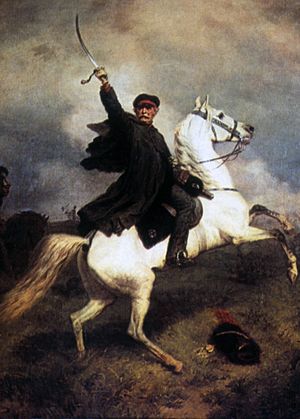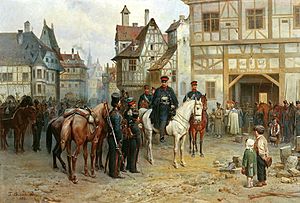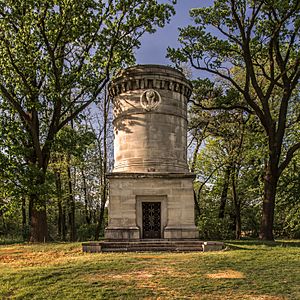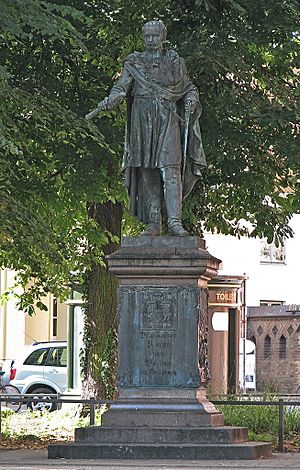Gebhard Leberecht von Blücher facts for kids
Quick facts for kids
Gebhard Leberecht von Blücher
|
|
|---|---|
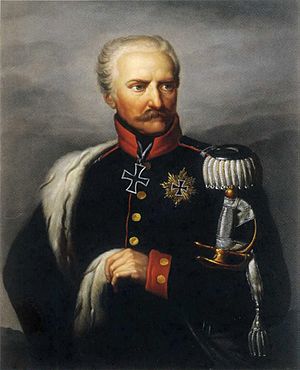
Gebhard von Blücher by Ernst Gebauer
|
|
| Nickname(s) | Marschall Vorwärts (Marshal Forwards) |
| Born | 21 December 1742 Rostock, Duchy of Mecklenburg-Schwerin, Holy Roman Empire |
| Died | 12 September 1819 (aged 76) Krieblowitz, Province of Silesia, Kingdom of Prussia, German Confederation (present-day Krobielowice, Lower Silesia Voivodeship, Poland) |
| Allegiance | |
| Service/ |
|
| Years of service | 1758–1815 |
| Rank | |
| Battles/wars | Seven Years' War
Prussian invasion of Holland |
| Awards | Star of the Grand Cross of the Iron Cross Pour le Mérite Order of St. George Military Order of William Military Order of Maria Theresa |
| Spouse(s) |
Karoline Amalie von Mehling
(m. 1773; died 1791)Katharine Amalie von Colomb
(m. 1795) |
| Signature |  |
Gebhard Leberecht von Blücher (born December 21, 1742 – died September 12, 1819) was a famous Prussian field marshal. He is best known for leading his army against Napoleon I at the Battle of Leipzig in 1813 and the Battle of Waterloo in 1815.
Blücher was born in Rostock, Germany. His father was a retired army captain. Blücher started his military career in 1758 as a hussar (a type of cavalry soldier) in the Swedish Army. He was captured by the Prussians in 1760 during the Pomeranian War. After being captured, he decided to join the Prussian Army. He served as a hussar officer for Prussia during the rest of the Seven Years' War.
In 1773, Blücher had to leave the army because of Frederick the Great. He worked as a farmer until Frederick died in 1786. Then, Blücher was allowed to rejoin the army and was promoted to colonel. He became a major general in 1794 for his success in the French Revolutionary Wars. In 1801, he became a lieutenant general. He led the cavalry during the Napoleonic Wars in 1806.
War between Prussia and France started again in 1813. Blücher, at 71 years old, returned to active duty. He was made a full general and fought Napoleon at the Battles of Lützen and Bautzen. He later won an important victory against the French at the Battle of Katzbach. Blücher led the Prussian Army of Silesia at the Battle of Leipzig, where Napoleon was defeated. For his role, Blücher became a field marshal.
After Napoleon returned in 1815, Blücher took command of the Prussian Army of the Lower Rhine. He worked with the British and Allied forces led by the Duke of Wellington. At the Battle of Ligny, Blücher was badly hurt, and the Prussians had to retreat. After recovering, Blücher rejoined his army and helped Wellington at the Battle of Waterloo. His army's arrival was very important for the final Allied victory.
Blücher was made an honorary citizen of Berlin, Hamburg, and Rostock. His soldiers called him Marschall Vorwärts ("Marshal Forward") because he was always aggressive in battle. He was one of the most decorated Prussian-German soldiers in history. He and Paul von Hindenburg are the only ones to receive the Star of the Grand Cross of the Iron Cross.
Contents
Biography
Early Life and Military Beginnings
Blücher was born on December 21, 1742, in Rostock, a port city in northern Germany. His family was noble and had owned land in northern Germany for centuries. His father was a retired army captain.
At 16, Blücher began his military career. He joined the Swedish Army as a hussar. At that time, Sweden was fighting Prussia in the Seven Years' War. In 1760, Prussian hussars captured Blücher during a small fight. The Prussian colonel, Wilhelm Sebastian von Belling, was impressed by Blücher. He convinced Blücher to join his Prussian regiment.
Blücher gained a lot of experience as a cavalry officer during the Seven Years' War. However, his strong personality sometimes caused problems. In 1773, he was forced to resign from the army by Frederick the Great. Frederick famously replied to Blücher's resignation letter with "Captain Blücher can take himself to the devil."
Return to the Army and Promotions
Blücher then became a farmer. Over 15 years, he became financially independent. He also joined the Freemasons. After Frederick the Great died in 1786, Blücher was able to return to the army. The next year, he was reinstated as a major in his old regiment.
He took part in a military expedition to the Netherlands in 1787. The following year, he was promoted to lieutenant colonel. In 1789, he received Prussia's highest military award, the Pour le Mérite. In 1794, he became a colonel. Blücher showed great skill in cavalry actions against the French in 1793 and 1794. For his victory at Kirrweiler in May 1794, he was promoted to major general. In 1801, he became a lieutenant general.
Napoleonic Wars and Key Battles
Blücher was a key leader who wanted war with France in 1805. He served as a cavalry general in the difficult campaign of 1806. At the Battle of Jena-Auerstedt, Blücher bravely led cavalry charges. However, the Prussian army was defeated. During the retreat, he commanded the rearguard.
After the main Prussian army surrendered, Blücher led his remaining troops northwest. He gathered more soldiers, forming two small corps of 21,000 men. But he was defeated by French forces at the Battle of Lübeck in November. The next day, trapped near the Danish border, he had to surrender with fewer than 10,000 soldiers. Blücher was later exchanged for a French marshal. He continued to serve until the war ended.
After the war, Blücher was seen as a leader of the "Patriot Party." This group wanted to resist Napoleon's control. In 1809, he became a general of cavalry. In 1812, he spoke out against Russia's alliance with France. Because of this, he was removed from his military position.
When the War of Liberation began in 1813, Blücher was again given a high command. He was present at the Battles of Lützen and Bautzen. During a break in the fighting, he helped organize the Prussian forces. When the war restarted, he became commander-in-chief of the Army of Silesia. He had 40,000 Prussians and 50,000 Russians under his command.
Blücher was known for his incredible energy. He often pushed other generals to cooperate. If they didn't, he was ready to act alone. He defeated Marshal MacDonald at the Battle of Katzbach. His victory over Marshal Marmont at Möckern helped lead to Napoleon's defeat. This decisive battle was the Battle of the Nations at Leipzig. Blücher's army stormed Leipzig on the final day of the battle. This was Blücher's first major victory against Napoleon.
On the day of Möckern (October 16, 1813), Blücher was made a field marshal. After the victory, he chased the French with his usual energy. In the winter of 1813–1814, Blücher was key in convincing the Allied leaders to invade France.
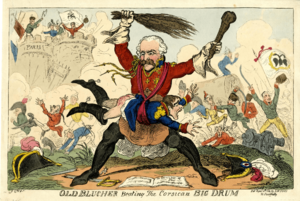
The Battle of Brienne and the Battle of La Rothière were important early battles in the 1814 campaign. Napoleon then won victories against Blücher at Champaubert, Vauchamps, and Montmirail. But Blücher's courage remained strong. His victory against the French at Battle of Laon (March 9–10) was crucial for the campaign.
After this, Blücher helped energize the operations of Prince Schwarzenberg's army. Eventually, both armies marched together toward Paris. The victory of Montmartre, the Allies entering Paris, and the end of the First Empire followed directly.
Blücher wanted to punish Paris severely for Prussia's suffering. However, the other Allied commanders did not agree.
For his victories in 1814, King Frederick William III of Prussia made Blücher Prince (Fürst) of Wahlstatt. He also gave him estates near Krieblowitz (now Krobielowice, Poland) and a large house in Berlin. Soon after, Blücher visited England. He was welcomed like royalty and cheered by crowds everywhere.
When Oxford University gave him an honorary doctorate, he joked that if he was a doctor, his chief of staff, Gneisenau, should be an apothecary. He said, "for if I wrote the prescription, he made the pills."
Hundred Days and Later Life
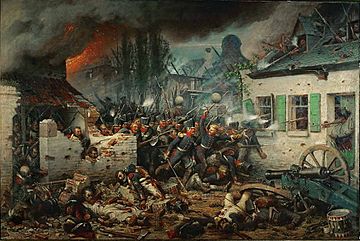
After the war, Blücher retired to Silesia. But Napoleon's return from Elba in 1815 called him back to duty. He was put in command of the Army of the Lower Rhine. Gneisenau was again his chief of staff.
At the start of the Waterloo Campaign of 1815, the Prussians suffered a serious defeat at Ligny on June 16. Blücher was trapped under his dead horse for hours. His aide, Count Nostitz, saved his life by covering him with a coat. This hid Blücher's rank from passing French soldiers.
Since Blücher couldn't command right away, Gneisenau took over. He led the defeated army away and regrouped them. Even though Gneisenau didn't fully trust Wellington, he followed Blücher's orders. He directed the army's retreat toward Wavre instead of Liège. This kept open the chance for the Prussian and Wellington's armies to join up.
After treating his wounds, Blücher rejoined his army. Gneisenau was worried the British might not keep their promises. But Blücher convinced him to send two army corps to join Wellington at Waterloo. Blücher then led his army on a difficult march through muddy paths. They arrived at the Battle of Waterloo late in the afternoon.
Blücher's army arrived at a critical moment in the battle. Their intervention was decisive. His leading troops drew away Napoleon's much-needed reserves. The main Prussian force helped crush French resistance. This led to a complete Allied victory. The Prussians then relentlessly pursued the French. The two Allied armies entered Paris on July 7.
Blücher stayed in Paris for a few months. But his age and health problems forced him to retire to his home in Krieblowitz. He also made another visit to England, where he was thanked for his army's role in the Waterloo Campaign. He died at Krieblowitz on September 12, 1819, at age 76. An impressive mausoleum was built for him.
Assessment
Napoleon described Blücher as a very brave soldier. He admired Blücher's attitude, saying he was like a bull that charges when it sees danger. Napoleon thought Blücher was stubborn and tireless, knowing no fear. He called him an "old rascal" who would always get back on his feet for the next battle.
Overall, Blücher was a courageous and popular general. He was praised for his energy, controlled aggression, and strong desire to defeat the enemy.
Legacy
Museums and Statues
The town of Kaub in Germany has a museum dedicated to Blücher. It remembers his famous crossing of the Rhine River with the Prussian and Russian armies on New Year's night 1813–1814. This crossing was part of the pursuit of the French army.
After Blücher's death, statues were built in his honor. You can find them in Berlin, Wrocław, Rostock, and Kaub. A bust of Blücher is also in the Walhalla temple near Regensburg.
Ships and Locomotives
George Stephenson, a British engineer who pioneered locomotives, named one of his early steam engines "Blücher." A small mining village near Stephenson's birthplace is also named Blucher.
Three ships of the German navy have been named after Blücher. The first was the corvette SMS Blücher, launched in 1877. The armored cruiser SMS Blücher was launched in 1908. It was sunk in 1915 during the First World War. The heavy cruiser Blücher was completed in 1939. It was sunk in 1940 during the invasion of Norway.
In Popular Culture
Blücher was played by German actor Otto Gebühr in the 1929 film Waterloo. He was also the subject of the 1932 biographical film Marshal Forwards, where Paul Wegener played him. In the 1970 Soviet-Italian film Waterloo, Soviet actor Sergo Zakariadze portrayed him.
A popular German saying, geht ran wie Blücher ("charge like Blücher"), means that someone is taking very direct and aggressive action. It refers to Blücher's vigorous behavior in battle.
Images for kids
-
Castle in Trzebina (Kunzendorf), near Prudnik
(owned by the Blücher family 1812–1817)
See also
 In Spanish: Gebhard Leberecht von Blücher para niños
In Spanish: Gebhard Leberecht von Blücher para niños
- Evelyn Princess Blücher
- Blücher Order
- Blucher shoe
- Blüchern
- Brothers von Blücher
 | James Van Der Zee |
 | Alma Thomas |
 | Ellis Wilson |
 | Margaret Taylor-Burroughs |


